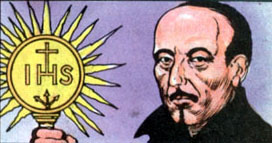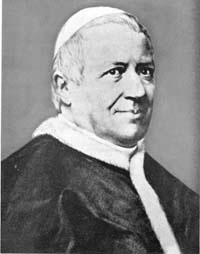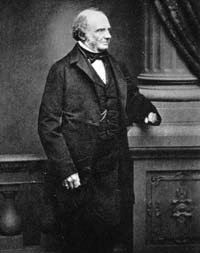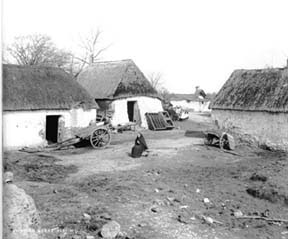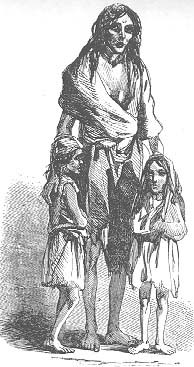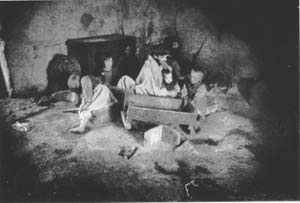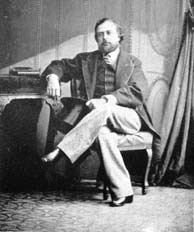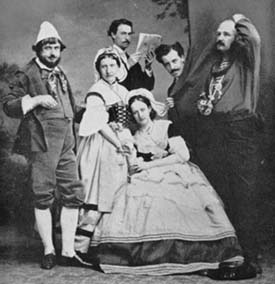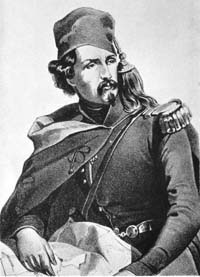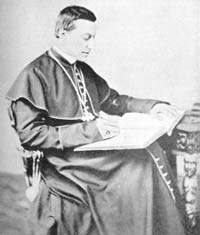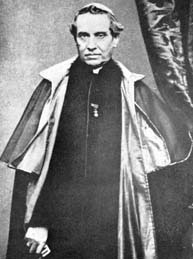The Great Irish Famine (1846-52).Rome is completely dependant on the Irish Hierarchy to make America and the world Roman Catholic. They are the majority at the State Department and the Pentagon. One of the most prominent families in this conspiracy is the Kennedy family. We will now see how Rome engineered a Holocaust in Ireland and then proceeded to blame the British Protestants . . . in order to recruit soldiers to fight Garibaldi and restore the Temporal Power. Beyond the Viking/Norman fortresses of Dublin, Limerick, and Cork, there was no Roman Catholicism in Ireland prior to the Reformation. As a matter of fact, the country called Ireland didn't exist at all!! Just 2 years prior to that great event, Pope Leo X, banned the Hibernians from St. Patrick's Cathedral by a perpetual decree. Rome hated the independent Gaelic church founded by the Great St. Patrick and the Hibernians always returned the compliments. Ignatius Lieola and his Jesuits brought this new religion to Ireland in the 16th century. Rome was tottering on her foundation from the mighty blows of the pen of Martin Luther. William Tyndale translated the Bible into English and it was the catalyst for that country's liberation. Rome desperately needed a second front and Ireland was the only logical choice. Before that time, all the invasions had come from Norman England but the desperate times demanded desperate measures. This is why the Popes befriended the Hibernians and told them to forget about the past: about Palladius, the Vikings, the Norman invasions, the excommunications, the anathemas etc., etc.
LIEola and his Jesuits brought Romanism to Hibernia during the 16th century. During the Dark Ages - after giving them the Good News - the Irish missionaries showed the savages of Europe how to build houses, grow crops, and enjoy the blessings of civilized life. After 2 centuries of Romanism the country was in appalling condition. Poverty, misery, ignorance reigned and ever the ground seemed to be cursed.....Conditions mirrored those of the Papal States except Ireland was allowed to have railways and telegraphs. The staple diet was the potato, but that crop failed in the year 1845. The British Prime Minister at that time was Sir Robert Peel and he immediately sent famine relief to the country. 1845As soon as the reports of the disaster reached Britain, the Prime Minister, Sir Robert Peel, took immediate action:
Government efforts were also helped by some local landlords who lowered rents and distributed clothes and food to their tenants. As a result, many landlords went bankrupt. The Quakers (The Society of Friends) also did much to help. It is difficult to find out how many famine victims, if any, died under Peel's Government. The Freeman's Journal newspaper reported at the time:
1846The year 1846 was a disaster not only for Ireland but all of Europe and indeed the entire world. Sir Robert Peel's Government was replaced by a new administration and that was the year that "Pio Nono" was elected Pope. Born Giovanni Maria Mastai-Ferretti in May 13th 1792, he died on Feb. 7, 1878. Impius promulgated the doctrine that Mary the mother of Jesus was born without sin (immaculate deception); issued a Syllabus of Errors, and declared himself infallible in 1870, the very year he lost the rulership of Rome forever!! He was the most hated man of the 19th century while Garibaldi was the most loved!!
Roman Emperor Pius IX (1846 -1879). During that time, the 3rd Empire ruled the world and Rome had a family at the center of power. It was called the Russell family!!The only thing worse than a Spanish Jesuit is an English Jesuit!!
Lord John Russell, SJ. Lord John Russell became Prime Minister in 1846 and completely reversed his predecessors policy of aid for the famine stricken nation. He offered the Pope asylum in Malta should he have to evacuate Rome. His nephew, Odo Russell, was appointed English representative to the Vatican. He was Foreign Secretary during the American Civil War and was Prime Minister again from Nov. 1865 to June 1866. As a result of this changed policy, over a million people starved to death and millions more emigrated. . . . It was the worst man made disaster of the 19th century.
The only people who did anything to help were the Quakers (Society of Friends). The priests condemned anybody who took aid from them and said that they were selling their souls for soup, as a result they earned the nickname "Soupers." As a result of this ostracism, many more people starved to death. What was the "Holy Father" doing during this calamity? Was he planning on selling some of the fabulous treasures at the Vatican and rushing aid to his famishing family in faith? By no means! He was keeping a watchful eye on one person - General Garibaldi - and was planning on moving to heretical Protestant England if he should lose Rome to the despised Italian nationalists. As a matter of fact the Pope's bounty on the head of Garibaldi would have fed a lot of Irish children.
Odo Russell, nephew of Lord Russell, was the equivalent of Papal Ambassador to Rome. Nobody but a devout Roman Catholic would ever be considered for that position. The Pope would definitely not want a Protestant in that position telling him that he was not the Vicar of Christ. He would very quickly get the poison cup!! As planned, the famine survivors blamed the British and Rome was inundated with recruits. Thousands of Irish soldiers fought and died on the Italian battlefields in order to retain the Pope’s Temporal Power. You even had an Irish brigade called the "Knights of St. Patrick" "Make Roman Martyrs in Ireland" Pope saysDispatches from Rome page 7367 [Foreign Office 43/721 Rome, 3O Dec. 1859 No. 148 Odo Russell to Lord John Russell. Cardinal Wiseman has arrived in Rome and taken up his quarters at the English College. His Eminence has been met here by Bishops Errington, Ullathorne, Roskell, Monsignor Searle and Dr Juin, Bishop of Brisbane in New South Wales. Other English and Irish Bishops are expected and the large concourse of foreign priesthood already assembled in Rome indicates that the Pope is dealing out instructions to his flock intended to meet the difficulties which threaten the Holy See.... The Pastoral Letters dictated from Rome to the Bishops of France have not kindled the religious enthusiasm they were intended to evoke, and the reserved and mysterious policy of the Emperor Napoleon in regard to the Legations has deeply alarmed the Curia Romana. The Catholic Powers in general have disappointed and disheartened Pope Pius IX by not shewing more zeal in effecting the restoration of the Romagna, but on the other hand His Holiness has lately declared himself deeply touched by the sympathy his cause has met with in Ireland. It had been piously hoped that by directing the Irish priesthood to cause their flocks to give full utterance to their feelings towards England, Her Majesty's Government might have been terrified into taking violent measures of repression against the friends of the Pope, which might have added some new names to the "Roman Martyrology." The failure of all these hopes has caused surprise sorrow and vexation at the Vatican. The whole aspect of affairs at Rome, the attitude assumed by the entire Hierarchy, tends to prove that the instructions to the Roman clergy in foreign countries now emanating from the Vatican are imbued with a troublesome, spiteful and revolutionary spirit which is scarcely calculated to win the sympathies of foreign governments in favor of the Papacy. Irish soldiers to fight Garibaldi and Italian Unity!!Dispatches from Rome page 10299 [Foreign 0ffice 43/77] Rome, 10 May 1860 No. 65 Odo Russell to Lord John Russell. I inquired of the Cardinal Secretary of State what truth there was in the report that the Papal Government expected one thousand Irish recruits at Ancona by way of Belgium and Trieste. His Eminence replied that since the War Department was no longer under his control the formation of the Papal army was entirely in the hands of General de Lamoricière and he was not thoroughly acquainted with all the measures taken by his Excellency but he believed the General reckoned on obtaining about one thousand Irishmen for the Papal army. They came of their own free will to Italy and enlisted here. Nothing would induce the Papal Government to attempt enlistments in Ireland, they had too much respect for the laws of other countries, and since it was prohibited to enlist in the Papal States for foreign armies, the Pope respected in other states the laws he wished to see respected in his own dominions. His Holiness was constantly receiving letters from Irish gentlemen offering to bring him from three to five thousand men at any time, but the Sovereign Pontiff had always declined to entertain such offers. His Eminence did not for many reasons think it desirable to have a large number of Irish soldiers in the Papal army, but the question at present was to form an army sufficiently strong for all police purposes in the Papal States, so as to make the French occupation cease altogether and free the Papacy from all foreign intervention and he most sincerely hoped and believed that for the sake of this long desired and much discussed object, Her Majesty's Government would generously throw no impediments in the way of such of her Roman Catholic subjects, who, of their own free will, proceeded to Rome to offer their services to the Pope. "Irish soldiers are unruly . . . feel sorry for Brits" Pope says.Despatches from Rome page 117120 [Foreign 0ffice - 43/86B] Rome, 10 July 1862 No. I00 Odo Russell to Lord John Russell The Irish recruits of the Pope amount now to about thirteen hundred, and the enlistment in Ireland has been stopped. They continue to be very riotous and disorderly and are a source of constant trouble and annoyance to the Papal authorities.... They are a wild set of fellows who seem to enjoy a rare amount of exuberant spirits. Here at Rome a good many of them have called at the British Consulate complaining that they had been deceived in Ireland by every kind of promise, that they had never enlisted but had simply come to look for work and were now compelled to enter the Papal army against their will, and they claimed to be sent home to Ireland at the expense of Her Majesty's Government.... I called on Cardinal Antonelli and told him that although I had no instructions to do so, I wished privately and on my own account to call his attention. to the complaints made by Her Majesty's subjects in the Pope's service and to enquire of him whether anything could be done to render them more satisfied with their present condition. His Eminence replied that he was glad I mentioned the subject to him since he wished to tell me that he had given orders to send home all those who since their arrival in the Papal States objected to serve in the Papal army, that the Pope only sought volunteers and wished no one to serve him against his own free will. All those, therefore, who asked to go home would be sent back to Ireland at the expense of the Papal Government, and those who wished to remain were treated with great kindness by General de Lamoricière who had taken a fancy to their fine military appearance.... His Eminence related many anecdotes about the excesses they had committed, and said he now understood why I had eight months ago so strongly urged him not to form an Irish Legion, that the Pope as well as himself had not known the Irish character to be so energetic and that he could also now appreciate the difficulties experienced by the British Government in dealing with Ireland etc., etc....
General de Lamoricière, commander of the French Mercenaries. No number of foreign mercenaries could deny General Garibaldi his goal of liberating his country and making Rome its Capital. In 1862 he was ready once more to march on Rome. It was then that the Pope summoned Odo Russell and asked for asylum in heretical Protestant England whose Government had just committed Genocide on his subjects in Ireland!! "I want to move to England" Pope says!!Dispatches from Rome page 344-237.240 [Foreign 0ffice - 43/86B] Rome, 26 July 1862 No.100 Odo Russell to Earl Russell. Last night I received rather unexpectedly from the Vatican a written information that the Pope would receive me today at 12 o'clock. I found His Holiness alone reading Sir James Hudson's dispatch in a newspaper respecting his journey through the Papal States to Naples. His Holiness complained that Sir James Hudson did him injustice when he said that the only improvements he had seen in Rome were the introduction of gas and public carriages. He wondered I had not shown Sir James the churches built and repaired and the public works of general utility executed during his reign. I replied that the improvements Sir James Hudson sought and thought necessary for the good of the country were of a different nature. His Holiness said that Sir James Hudson seemed to think that all the agricultural improvements he had seen in the Marches were the work of the last two years only, and he added laughing that in his opinion Sir James had not contributed to the wonderful agricultural improvements described by thus planting carrots (piantar carote in Italian means to exaggerate). After a few words on my part in defence of Sir James Hudson's views, His Holiness interrupted me to say that he had heard I was going to England on leave of absence and that he had sent for me to wish me a pleasant journey and to ask when I should return to Rome. He then went on to speak of my mother's late illness and observed that "since I had done so much for la madre in Rome, could I not do something for il Papa in London" I replied that I should be happy to serve His Holiness in any way I could but that I did not well understand what he meant. The Pope said he was now forsaken by every Government in Europe, all were against him, and probably even Spain would recognize the Kingdom of Italy. The recognition of Italy by Russia was the work of France. He had received several very curious letters from St Petersburg on the subject which left no doubt in his mind that prince Gortchakoff's new Italian policy was the price paid for certain concessions on the part of France in the east. Those concessions were contrary to British interests, and England, forsaken by her present ally, would have to re-establish her old alliance with Austria, an alliance which would meet with his full sympathies. I might object that the Pope, being the weakest sovereign in the world, his sympathy was of no great weight or value, but he would remind me that the progress made by the Latin Church in the east was such as to become a serious cause of alarm to the Russian Government and that the Latin Church was the most formidable enemy Russian policy would have to encounter in the east. Under such circumstances he regretted much that Your Lordship and Her Majesty's Government should be so hostile to the Papacy. I here explained to His Holiness as I had done before that Her Majesty's advisers; were not hostile to the Papacy, but that they considered the Pope's temporal independence to be lost since His Holiness had refused to introduce those administrative reforms which were necessary for the re-establishment of confidence between the people and their sovereign and had preferred the presence of a foreign army to the confidence and attachment of his subjects. The Pope replied that I was mistaken, that he was beloved by his subjects, who were content and happy and that the demonstrations made against his Government were the work of Piedmontese agents, who paid some poor devils five bajocks a head to cheer King Victor Emmanuel and fire tri-coloured Bengal lights, but he did not wish to discuss that question at present. He wished rather to ask me a question. The French Emperor, he continued, after making the late extraordinary and unacceptable propositions to him through Monsieur de Lavalette, had evidently organized the present Garibaldian movement with the cabinet of Turin to establish the basis of an excuse for handing over Rome to the Piedmontese. The whole of Monsieur de Lavalette's and Monsieur de Montebello's proceedings for the defence of Civita Vecchia, the last place Garibaldi would think of attacking, were a farce (une comidie). It might therefore become the Pope's duty to leave the Holy See, and it was evident he could not seek protection from the Catholic countries, who, notwithstanding the proclaimed principles of the Church, had recognized the Kingdom of Italy. Spain was likely to follow their example, Austria there were other objections to. Did I, under these circumstances think that he could go and live in peace in England? I replied that in England the rights of hospitality were sacred. But would he not, His Holiness continued, be molested or insulted by those violent Protestants whose speeches he read in the newspapers, and could he attend to his duties as Pope (faire le Pape) without meeting with serious impediments on the part of the English Government? I replied that so long as he submitted to the laws of the land, he could enjoy that national hospitality and protection England extended to those who sought refuge within her realms, but at the same time I trusted His Holiness would never have to resort to so extreme a measure and would rather make peace with Italy than abandon Rome. The Pope shook his head mournfully and asked me whether I had read the late declaration of the Bishops and whether I had ever taken the trouble to study the Roman Catholic religion. I replied that I had, but that neither the declaration of the bishops nor the principles of the Catholic Church had convinced me of the necessity of the Temporal Power. I believed on the contrary that the Spiritual Power would be far stronger without that temporal millstone round the neck of the Papacy which required the support of a foreign army to impose it upon Italy. Indeed the Temporal Power as it now existed appeared to me a serious impediment to the free exercise of the Spiritual Power and I wondered he had not cast it away since it was now evident that it could not be upheld many years longer without endangering the peace of Europe and the unity of the Roman Church. "My son," the Pope said, "the Temporal Dominion was given by God to his Vicar upon Earth. God alone can take it from him. The Lord's will be done." "And if events," I continued, "deprive Your Holiness of the Temporal Dominion, what then?" "Then," the Pope replied, "I must submit to God's will, but I cannot by any act of my own give up the States of the Church which I hold in trust. They are not my property, I cannot dispose of them, God must decide whether his Vicar on Earth is to be a temporal sovereign or not." Then, changing the subject, His Holiness entered into a religious discussion, expressed his regrets that the late Duke of Norfolk had turned Protestant on his deathbed and finally asked me whether I felt no desire to become a Roman Catholic. I replied that I did not. I was born a Protestant and should die a Protestant. "You are a Protestant," the Pope said, laughing, "like Lord Russell who wants to destroy my Temporal Dominion. He was the first to recognize the Piedmontese spoliations of the Church. "And his policy," I added, "has been followed by almost all the powers of Europe, notwithstanding their previous objections, which is a proof that Lord Russell inaugurated a true, a good and a great policy." "Notwithstanding your opinions," the Pope observed good humouredly, "I shall expect you to protect me if I go to England. Io vi benedico and if you think the Pope's blessing would be acceptable to your mother and brother, I give it them with all my heart." In the Pontifical antechamber I met Monsignor de Wérode who held similar language to me, adding that he was a prophet and foresaw that England in the end would act towards Pius IX as she had acted towards Pius VII. Having discouraged his hopes, I called according to custom on Cardinal Antonelli whom I found equally disposed to expect great things from England in consequence of the supposed Franco-Russian alliance for eastern affairs. I told him that I thought the best chances for the Papacy were to be sought in a cordial understanding between the Pope and the King of Italy and not in an imaginary war between France and England. I need scarcely add that there is no prospect whatever of the Pope ever carrying out his threat of going to England. The Garibaldian movement may serve as a pretext to increase the French garrison at Rome, but not to withdraw it. In all probability the Pope's intention is that I should report what he has said and that the French Government should feel the necessity of taking measures to ensure his remaining in Rome, as his flight to England would have a bad effect in France. I have therefore not mentioned the Pope's conversation with me to anyone.
Monsignor de Wérode "Your ship is waiting" Russell tells Pope.Foreign Office Oct. 25, 1862 Earl Russell to Mr. Odo Russell Sir, Her Majesty’s Government has observed with great interest the correspondence that has been published in the "Moniteur" on the 25th of last month. The Emperor of the French in this correspondence points out with great force and precision the evils which flow from the present position of affairs in Rome. His Majesty calls the attention of the Pope to the undoubted fact that while everything that is liberal in Europe condemns the resistance of his holiness to every proposal of arraignment, the most attached adherents to the See of Rome find their conscience troubled by the antagonism between their "political convictions and modern civilization". To all the reasons thus powerfully set forth, Cardinal Antonelli replies on the part of the Pope with a summary declaration of the Pope’s inability to agree to any compromise which should leave him with less than the whole of his former territory. This is a perilous situation. The Pope allows his spiritual authority to be impaired, and his hold over the Roman Catholic Church to be weakened, by his resistance to the wishes of the Italian people. It does not become Her Majesty’s Government to dwell upon the dangers otherwise than as one to which the religious mind of the Pope must be keenly alive. But the political evil is one upon which Her Majesty’s Government may fairly dwell. The personal character of the Pope is marked by benevolence and charity. As an Italian he must feel for the suffering of Italy. As the supreme head of the Roman Church he declared in 1849 that it did not belong to his character to draw the sword. The position of a peaceful Sovereign, animated with equal love towards contending parties and towards hostile armies, has been claimed for him by Bishops, who met this year at Rome, and who expressed their sentiment in an address to his holiness. Yet in contradiction to his own view of his position, in opposition to the picture drawn by him by the most eminent of own Church, the Pope’s territory has become a refuge for one of the contending parties, and the name of religion has been used as the justification for civil war. We see conflicts of unusual ferocity take place under the pretence of such conflicts being necessary to vindicate the temporal power of the Pope. These scenes must move the kind heart and sadden the paternal feeling of Pius IX. Is there any way of terminating, or at least suspending the conflict? Placed in their present position neither party will give way. The Italian people will always ask for Rome, the Pope will refuse any terms of accommodation; whether they be those of the Emperor of the French, or Count Cavour, or of Baron Ricanoli. Must Rome then be the seat of perpetual foreign occupation? Must brigandage for ever ravage the fertile fields of Southern Italy? God forbid such a calamity! God forbid that Pope Pius IX should be the instrument of consigning his countrymen eternally to mutual hatred and sanguinary civil war. Her Majesty’s Government are of the opinion that Rome should be the capital of the Italian kingdom. But, it they are rightly informed, the Pope believes that a time will come when by general consent his former territories will be restored to him, and then his temporal power will resume its former splendour. If such is his sincere conviction, would it not become the Pope, that instead of being himself the principal cause of civil war in Italy, he should retire from the conflict, and expect in tranquility the issue which in the order of Providence may await the papacy, and determine the fate of Italy. In such a case the Admiral of Her Majesty’s Government in the Mediterranean would convey the Pope to Malta, to Trieste, to Marsailles, or to Valenica, and if his holiness should choose to remain in Malta, her Majesty’s Government would there provide a mansion fit for his reception. There his holiness might be surrounded by the chief Cardinals, and most trust counsellors. He would not be asked to subscribe to any condition repugnant to his conscience. Civil war would cease in Italy, and the Italian people would be at liberty to enjoy the complete possession of their own territory, or again to assign to the Pope, if they thought so fit, a temporal dominion. In all events his spiritual authority would resume its sway over the minds of the Roman Catholics of Italy and Europe. When the storm was past, the Pope might return to Rome, owing to love and affection that homage which would be paid to his sacred character, and to that veneration which would be justly due to his exalted personal virtues. You are directed to speak in the sense of this despatch to Cardinal Antonelli and to give him a copy of it to be submitted to the Pope. A copy of this despatch will be sent to Earl Cowley, for his information.
In the previous letter Lord Russell had just offered the Pope a Palace in Malta should he be thrown out of Rome. Russell was promoted to Earl and was then Foreign Secretary under Prime Minister Palmerston. Dispatches from Rome page 239244 [Foreign 0ffice - 43/86B] Rome, 11 November 1862 No. 108 Odo Russell to Earl Russell. In obedience to Your Lordship's instructions I called this morning on the Cardinal Secretary of State at the Vatican and told him that Her Majesty's Government had observed with great interest the correspondence respecting Rome which had been published in the Moniteur of 25 September last, and that I would, with His Eminence's permission, communicate a despatch to him which I had received from Your Lordship on the subject. I then read Your Lordship's despatch of 25 October to Cardinal Antonelli, who listened with great attention and when I had done said he thought Your Lordship could scarcely be more anxious than he was that Rome should not be the seat of a perpetual foreign occupation. He ardently desired to see the Pope in the full possession of that independence which became the Sovereign Pontiff, the visible head of the Roman Catholic Church, independent of enemies who persecuted the Church and independent of friends whose protection could not unhappily yet be dispensed with. But since the enemies of order and legitimate right in Italy had been encouraged in their reckless and immoral course and since the Pope had not the means to protect the temporal interests of the Church against their violence and rapacity without foreign assistance, he was compelled to accept the protection afforded him by the presence of a French garrison in Rome. Your Lordship observed truly that this melancholy state of things in Italy wounded the kind heart and harrowed the paternal feelings of His Holiness, and you were equally right in concluding that the conscientious feelings of duty of the Pope would always oblige him to refuse any terms of accommodation, whether recommended by the Emperor of the French or by any other power, which should leave him with less than his former territory. The reasons which prompted this course of action were obvious: the Pope did not hold the States of the Church as an inheritance from his ancestors and could not dispose of them at his will either before or after death. As Vicar of Christ he held them in trust from God for the Catholic World, and as he received them, so he had to leave them to his successor according to the oath taken by the Pontiffs on ascending the throne of St Peter. And again, the Pope as Vicar of Christ and therefore as the Guardian of Religion and Morality on Earth could not give his sanction to acts which violated every law of public morality and of legitimate right, and however much his heart might bleed at the sad conflict around him he had a duty, as head of the Catholic Church, to perform for which he was answerable to God alone in heaven and not to man upon earth. This conscientious policy pursued by the Pope had been publicly and unanimously approved by the whole of the bishops of Catholic Christendom, and while His Holiness could fulfil the sacred duties of his office in any portion of the Holy See, however small and limited, with freedom and independence it was his duty to assert the temporal rights of the Church by remaining in it, until violently driven away by the enemies of religion. Now Your Lordship, animated by a friendly feeling to both parties, suggested that the Pope should retire from the conflict and expect in tranquility the issue which in the order of Providence might await the Papacy and determine the fate of Italy. But the abandonment of Rome,so long as its possession was guaranteed by France, would be tantamount to that very abdication of temporal rights which the conscientious feelings of duty of the Sovereign Pontiff for ever precluded. If the Pope left Rome, the Emperor of the French would naturally recall his troops to France, and Rome would he invaded by the enemies of the Church, a contingency towards which the Pope in his conscience could never contribute by any voluntary act of his own so long as he could there freely exercise the spiritual and temporal duties of his office. On the other hand, should it ever so please Providence in the course of events to allow the French protecting forces to be withdrawn and the Piedmontese to invade Rome, and should the free exercise of the Pontiff's spiritual duties thereby be endangered, then, and not till then, would it become the Pope's paramount duty to seek protection for the independence of the Church in some foreign land and the generous offers of hospitality now made by Her Majesty's Government might be gratefully accepted. Cardinal Antonelli then requested me to thank Your Lordship in the warmest terms for the communication I had made to him and asked me for a copy of your despatch which he said he would submit to the Pope. Without renewing a useless discussion I replied to Cardinal Antonelli that while I respected the conscientious motives which dictated the policy of the Sovereign Pontiff, I could not for my part, as he well knew, see any but the most disastrous consequences to the temporal interests of the Papacy from the maintenance of the status quo in Rome, and I felt sure that the day would come when the immense advantages to be derived by the Roman Catholic Church from the hospitality and protection on neutral ground now offered in a friendly and impartial spirit to the Pope by Your Lordship, would be acknowledged by the whole Catholic world. Lord Russell has done great things for Catholics....by starving them to death!!Dispatches from Rome page 8478 [Foreign Office 43/761 Rome, 31 January 1860 No. 19. Secret Odo Russell to Lord John Russell. It is customary for the diplomatic body to congratulate the Pope on the commencement of the New Year, but the British Agent, not being officially accredited and therefore not admitted to share the same privileges, is usually honoured with a private audience of His Holiness some time after the official ceremony has taken place. The order having been communicated to me I proceeded to the Vatican and thanked the Sovereign Pontiff for thus permitting me to offer him my best wishes for the New Year. The Pope received me in his usual benevolent and cheerful manner and I remained upwards of an hour and a half alone in conversation with His Holiness, who after many kind enquiries about myself seemed anxious to clear up various questions respecting the rebellion in India, the Ionian Islands, the Suez Canal, party feeling in England and Ireland, our laws and administration, our foreign relations and the state of our colonies etc., etc., on all of which I was sorry to find that the Sovereign Pontiff had but very superficial and incorrect views. I endeavoured therefore to the best of my knowledge to answer all the questions put to me by His Holiness and to destroy the erroneous and envenomed impressions he entertains respecting the statesmen and the policy of England, but I fear with very little success. It is right, however, that I should state that the Pope made two exceptions in the course of conversation and spoke in very high terms of Mr. Bowyer M.P. and the Marquess of Normanby. In answering His Holiness's enquiries respecting the nature of our administration I dwelt with warmth on the blessings of free institutions and self government which were productive of confidence between the people and their authorities and animated all with loyalty to the Sovereign, but the Pope merely observed that we English were unlike other people and that what suited us would not suit anyone else.... His Holiness passed to the Ecclesiastical Titles Bill and the Bishop of Liverpool, observing with a good humoured smile that be did not know whether it was permitted to give the Bishop his title in my presence. Then he spoke of the Volunteer movement in England and expressed a wish to enlist some Irish soldiers for his own army if he could do so without giving annoyance to Her Majesty the Queen. All Europe he thought would want soldiers next spring and be requested me to talk the matter over with Cardinal Antonelli. After a long and desultory conversation His Holiness said with sudden warmth: "You know the pamphlet le Pape et le Congrès and you know my answer to Goyon and all that followed? I do not know whether that pamphlet was written by the Emperor Napoleon or not, but I do know that he has forbidden my Bishops to speak and has taken violent measures against the Catholic newspapers who wrote in favour of the Papacy but he has taken no steps to prevent the extensive circulation of that pamphlet. But the truth is the French Emperor is now entirely in the hands of England. You are making use of him to carry out your policy, but that will not prevent him from turning against you too some day, and I do not think you have many friends in Europe to take your part when that moment comes, for even Austria who was your natural ally has been alienated from you by the hostility you have shown to the Papacy.' I could not allow these erroneous views to he uttered unnoticed and begging His Holiness to grant me a hearing I explained in plain but respectful language that England had no wish whatever to interfere with the Pope's spiritual power with which she had nothing to do one way or the other. As to his temporal government, we thought in common with the other European powers that it might be greatly improved and exercised in such manner as to establish relations of mutual confidence between the Government and the people and ensure thereby the future prosperity and welfare of the Papal States. We might regret that His Holiness had not followed the excellent advice tendered by France for the improvement of his temporal administration but we never contemplated any direct or indirect interference between himself and his subjects however much we might wish for the prosperity of our fellow creatures. The Pope, who had listened to me with unusual patience, interrupted me to say: "It is not in Italy that the seeds of discontent and revolt are to be sought, but in the example of England, the speeches of her public men, and the policy of Lord Palmerston. What advantage England derives from his policy I am unable to comprehend, but I will say one thing in his favour, he is not against the Roman Catholics, he has no inimical feeling towards them, whilst our bitterest enemy, and I will say so even before you, is Lord John Russell. His dislike to the Papacy and to the Catholic religion is so violent that he seems to tremble all over with hatred "trembler de haine" when he speaks against us. Why, I do not know, but I do know that it is so." The Pope was working himself into one of those passions he has lately been so often subject to, so I interposed: "Your Holiness has been misled and misinformed by mischievous people. No man has done more for religious liberty in England, no man has more sincerely laboured for the welfare and independence of your co-religionists, and yet no man has met with blacker ingratitude from the Roman Catholics than Lord John Russell." The Pope said with greater warmth, "After all it matters little what people say and do, no earthly power can destroy or even harm the Pope. You may all combine with the man who rules at present in France, to change the existing order of things, but the Catholics of the whole world will speak and God will protect his Vicar on earth. All that is done now is temporary and transitory, and the wicked will be punished, but the Papacy is of God and therefore everlasting." His Holiness spoke a good deal more but gradually became quite calm again and having made some further observations full of kindness, good humour and benevolent interest about myself, he told me I might ask to see him whenever I liked and dismissed me with the customary blessing. I left the Sovereign Pontiff and went according to usage to pay my respects to the Cardinal Secretary of State and report what had passed. After thanking Cardinal Antonelli for the gracious reception I had met with at the hands of the Sovereign Pontiff I told him how much I had regretted to find that His Holiness had conceived such erroneous impressions with regard to the policy of the statesmen of England. Cardinal Antonelli replied: "The Pope has been naturally much vexed by the late events, but as I was saying only yesterday to His Holiness, England represents a distinct national policy which is different from any other in the world, and her statesmen in carrying out that policy are merely doing their duty to their country as I am doing my duty to the Catholic world to whom the Papacy and the Holy See belong, in carrying out the orders of the Holy Father. In all the dealings I have had with you, your statements have been correct and we have been able to rely on them with perfect confidence, however much we may have disagreed with the policy of England in Italy. The Pope knows that, but what is he to say to the conduct of France towards us, which has been full of promise and deception and the ends of which are at present as mysterious as they are incalculable in the future? Where is all this to end? If France continues to change her rulers and her system of government as constantly as she has done for the last century she will become a living threat to the peace of the world and the other great Powers may possibly one of these days seriously consider the necessity of carrying General Blucher's plan into execution, namely, the division of France among themselves." I replied that such a plan appeared to me as wild and as practically impossible as it was morally iniquitous, but Cardinal Antonelli observed to me that we were all in the hands of God and must submit to His will with patience and humility.
Cardinal Antonelli, Vatican Secretary of State and Minister for WAR!!. During the American Civil War, Russell as Foreign Secretary was constantly urging his Government to intervene on behalf of the South. He allowed English shipyards to build Confederate warships and if it wasn't for the Russian Navy he would have declared war on President Lincoln. "I am praying for Confederate victory" Pope says.Dispatches from Rome page 288298 [Foreign 0fice - 43/9IB] L 'Ariccia near Rome, 30 July 1864 No. 59. Confidential Odo Russell to Earl Russell I had the honour to be received at a private audience by the Pope this morning at his summer residence, Castel Gandolfo. I was gratified both by the great improvement I noticed in the Pope's health and by the kind, cheerful and benevolent reception the Holy Father deigned to grant me. The audience was long and His Holiness was pleased to touch on an innumerable variety of subjects, so that I will merely give Your Lordship the general results of his remarks on subjects of public interest. Talking of Russia and Poland, the Pope strongly condemned both the religious persecutions of the Emperor and the revolutionary spirit of many of the Poles, tainted, he feared, by ‘Mazzinianism’. Entire liberty for the church of Rome was, be thought, the best if not the only means of restoring peace and happiness to Poland. With regard to Germany and Austria, His Holiness seemed to fear a general revolution as a natural consequence of the constitutional liberties conceded to the people by timid and imprudent sovereigns, and he deplored and condemned the philosophic tendencies of the Roman Catholic clergy in Germany. Of the increasing Catholic spirit in France the Pope spoke in laudatory and grateful terms. He saw a similar spirit growing in England among the faithful and although it might take more than a century, he felt confident that England would ultimately return to his flock. Turning to America the Pope expressed his deep regret that he could do nothing towards the re-establishment of peace between the Federals and the Confederates. He had written to both Presidents Lincoln and Davis, but without success. At the same time he would not conceal from me that all his sympathies were with the Southern Confederacy and he wished them all success. There were, His Holiness added, far more conversions to Catholicism in the South than in the North. The Pope desired me most particularly to tell Your Lordship that the story circulated in the newspapers respecting two Monsignori sent by him to influence the vote of the Roman Catholic members of Parliament in the Schleswig-Holstein question was utterly unfounded and an invention from beginning to end. He had never and would never interfere in such matters and Monsignori Talbot and Howard had gone to England for private business only. Great Irish Famine Links Irish Famine Genocide Committee Irish Holocaust and Genocide Education References The Roman Question, Extracts from the despatches of Odo Russell from Rome, 1858-1870, Edited by Noel Blakiston, London, 1962. House of Commons Sessional Papers, Accounts and Papers, 1863 Vol. LXXV Under Affairs of Rome. |
